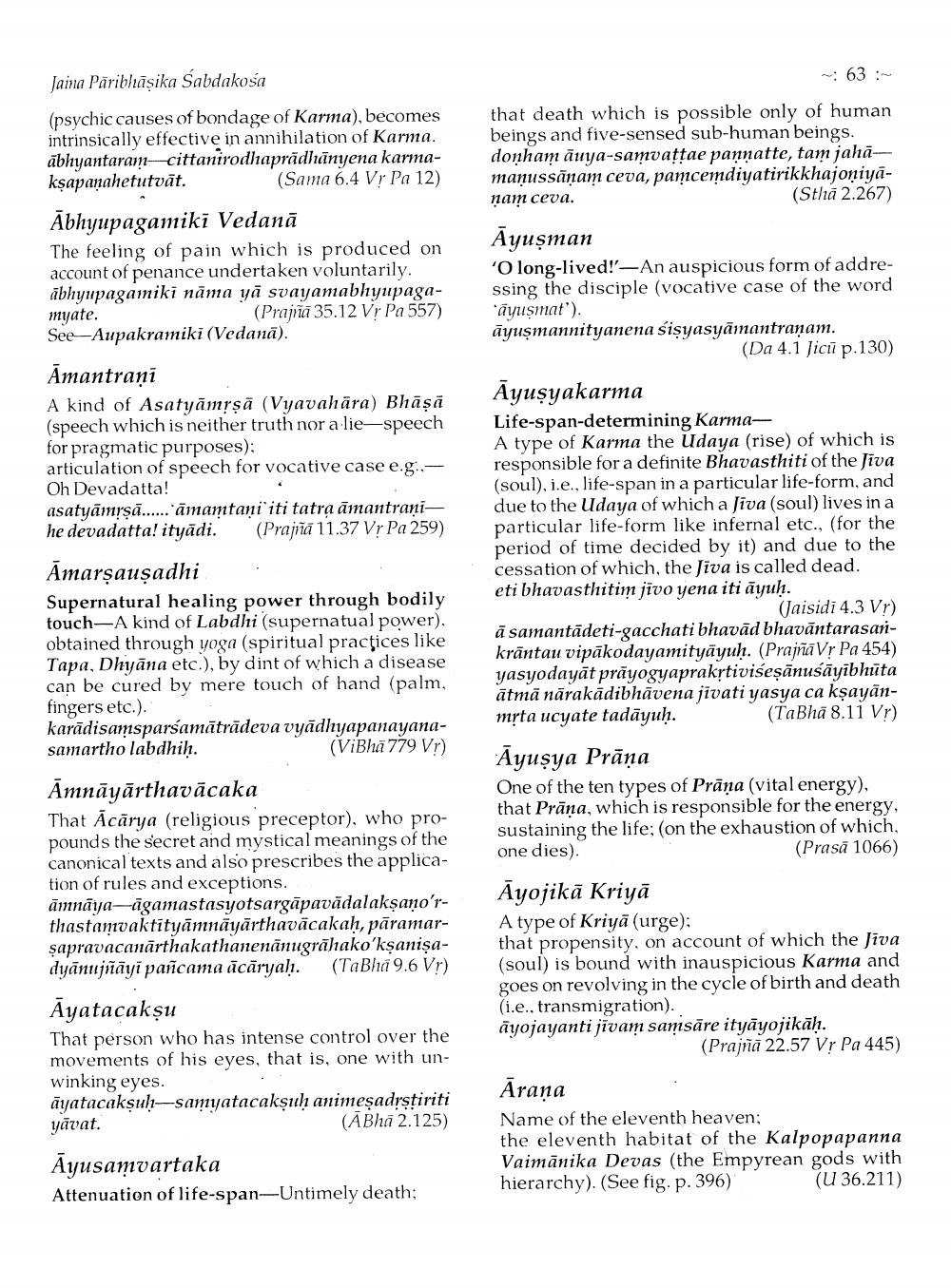________________
Jaina Pāribhāṣika Sabdakosa
- 63:
(psychic causes of bondage of Karma), becomes intrinsically effective in annihilation of Karma. ābhyantaram-cittanirodhaprādhānyena karmakşapanahetutvāt. (Sama 6.4 Vr Pa 12)
that death which is possible only of human beings and five-sensed sub-human beings. donham āuya-samvattae pannatte, tam jahāmanussānam ceva, pamcemdiyatirikkhajoniyanam ceva.
(Sthā 2.267)
Abhyupagamiki Vedanā The feeling of pain which is produced on account of penance undertaken voluntarily. ābhyupagamiki nāma yā svayamabhyupagamyate.
(Prajna 35.12 Vr Pa 557) See-Aupakramiki (Vedanā).
Āyuşman 'O long-lived!'-An auspicious form of addressing the disciple (vocative case of the word 'āyusmat"). āyuşmannityanena śisyasyāmantranam.
(Da 4.1 Jicu p.130)
Amantraņi A kind of Asatyāmrsā (Vyavahāra) Bhāṣā (speech which is neither truth nor a lie-speech for pragmatic purposes); articulation of speech for vocative case e.g.--- Oh Devadatta! asatyāmışā...... āmamtaņi iti tatra āmantranihe devadatta! ityādi. (Prajna 11.37 Vr Pa 259)
Āyuşyakarma Life-span-determining KarmaA type of Karma the Udaya (rise) of which is responsible for a definite Bhavasthiti of the Jiva (soul), i.e., life-span in a particular life-form, and due to the Udaya of which a Jiva (soul) lives in a particular life-form like infernal etc., (for the period of time decided by it) and due to the cessation of which, the Jiva is called dead. eti bhavasthitim jivo yena iti āyuh.
(Jaisidi 4.3 Vr) ā samantādeti-gacchati bhavād bhavāntarasankräntau vipākodayamityāyuh. (Prajňa Vr Pa 454) yasyodayāt prāyogyaprakrtivišeşānusāyībhūta ātmā nārakādibhāvena jivati yasya ca kşayanmrta ucyate tadāyuḥ.
(TaBhā 8.11 Vr)
Amarsausadhi Supernatural healing power through bodily touch-A kind of Labdhi (supernatual power), obtained through yoga (spiritual practices like Tapa, Dhyāna etc.), by dint of which a disease can be cured by mere touch of hand (palm, fingers etc.). karādisamsparsamātrādeva vyādhyapanayanasamartho labdhih.
(ViBhā 779 Vr)
Āyuşya Prāņa One of the ten types of Prāņa (vital energy), that Prāņa, which is responsible for the energy, sustaining the life; (on the exhaustion of which, one dies)
(Prasā 1066)
Āmnāyārthavācaka That Ācārya (religious preceptor), who propounds the secret and mystical meanings of the canonical texts and also prescribes the application of rules and exceptions. ämnāya-āgamastasyotsargāpavädalaksaņo'rthastamvaktityāmnāyārthavācakah, pāramarşapravacanārthakathanenānugrähako'kşanisadyānujñāyi pañcama ācāryah. (Tabha 9.6 Vr)
Āyatacaksu That person who has intense control over the movements of his eyes, that is, one with unwinking eyes. āyatacaksuh-samyatacakṣuḥ animeşadrstiriti yāvat.
(ABhā 2.125)
Āyojikā Kriyā A type of Kriyā (urge); that propensity, on account of which the Jiva (soul) is bound with inauspicious Karma and goes on revolving in the cycle of birth and death (i.e., transmigration). Āyojayanti jivam samsäre ityāyojikāḥ.
(Prajia 22.57 Vr Pa 445) Ārana Name of the eleventh heaven; the eleventh habitat of the Kalpopapanna Vaimānika Devas (the Empyrean gods with hierarchy). (See fig. p. 396)
(U 36.211)
Ayusamvartaka Attenuation of life-span-Untimely death;




